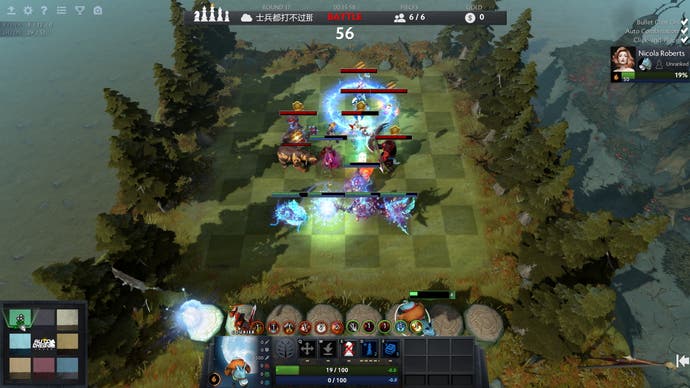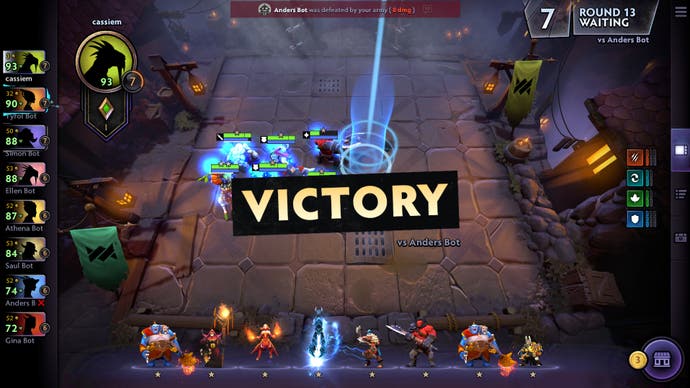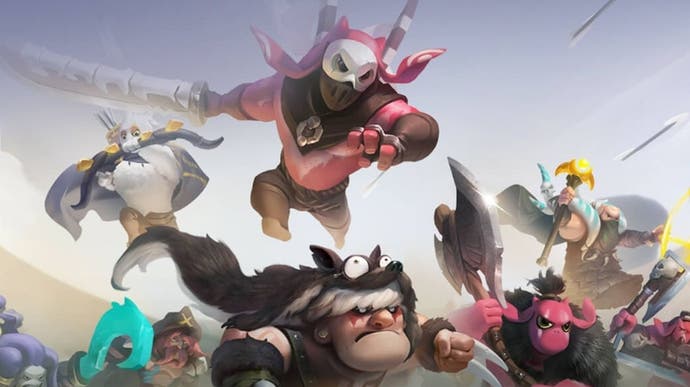Auto Chess proves again that it's modders who know what we really want
Your move.
About 10 years ago, at the Game Developers Conference in San Francisco, I went to see a game put together by an enterprising team of ex-modders who'd found some funding. It was based on a very popular Warcraft mod, a weird mutation of real-time strategy in which you only controlled one unit, around which an amusingly impenetrable subculture of memes and Eurodance YouTube videos had grown. The game was arcane and brutally competitive, drowning in jargon, and seemed to move both very fast and very slow, with interminably long matches. I didn't get it at all and found myself unable to assess its quality or prospects. I didn't write it up.
The game was League of Legends and it went on to be the biggest game in the world.
The big boys tried to get in on the action, of course. Valve hired a rival modder with claims of authorship over the Warcraft mod - Defense of the Ancients, or Dota - and, lunging for legitimacy, called its game Dota 2. It was even less accessible than League, and almost as big. Warcraft developer Blizzard belatedly tried to get in on a booming genre that had grown out of its own designs and code, squabbling with Valve over naming rights. Its game, Heroes of the Storm, was more approachable, knocking off some of the genre's sharper and rougher edges. It didn't catch on. There were many, many others, including games based on Lord of the Rings and DC comics superheroes. Most of them failed.

Now, it's happening all over again. A bizarre mod with apparently niche appeal is blowing up, and major developers are competing with the original modders to be the ones to define it as a commercial product. With pleasing symmetry, it's happening to a mod for one of those mod-based games, Dota 2. The auto chess wars have begun.
Auto Chess takes the building blocks and concepts of these games - which the League creators, Riot Games, dubbed multiplayer online battle arenas, or MOBAs - and puts them in service of something far more sedate. Eight players compete to field teams of champions against each other, setting team composition and placement for rounds of combat that then play out automatically. The champions level up over the course of a match, like in a MOBA, but the game is really one of deck-building and resource management, more like a collectible card game - if anything, even more passive.
Doesn't sound like a smash hit, does it? But the original Dota 2 mod, Dota Auto Chess, now has over 8 million players, and the "autobattler" gold rush has begun. Just like Riot, the mod's creators, Drodo Studio, have set out to create their own commercial version of the game. Just like Blizzard - but rather more timely - Valve has moved to keep Auto Chess players in the family with an official version called Dota Underlords. And of course Riot itself was hardly going to miss this trick, recently launching the League-based Teamfight Tactics. I am sure a Lord of the Rings autobattler is already being pitched to bemused Warner Bros executives in a boardroom somewhere. One of these games could very well turn into the next biggest game in the world.
If that sounds far-fetched, you don't need to search long to find examples of this pattern outside the MOBA scene. The battle royale genre's modding roots are even more tangled than MOBAs', though it was arguably Brendan Greene's mod for DayZ, itself a mod for military sim Arma 2, that nailed the format by blending Hunger Games-style last-man-standing competition with DayZ's scavenging and survival gameplay. Greene launched PlayerUnknown's Battlegrounds and cleaned up. Epic moved quickly and opportunistically with a battle royale mode for its struggling survival game Fortnite and struck gold. It became, guess what, the biggest game in the world.
So history tells us that the most likely to succeed in this scenario are the original modders, who have the clearest understanding of how the gametype works, and/or the fastest-moving corporate opportunist. Anyone hoping to buy their way in with a big licence or game franchise a year down the line is out of luck. This stuff happens fast. The winning autobattler is already out there - going by Twitch streams, it's probably Teamfight Tactics, which has almost as many viewers as Fortnite at time of writing - and the runner-up spot is already tied up, so save yourselves a lot of bother and put those design documents away. The auto chess wars may only have just begun, but in a sense they're already over.

The interesting thing about this phenomenon isn't who's going to win, though. It's that it keeps happening. It even happens to the games born from it. And the games it brings about are, invariably, three things: insanely popular; focused on a rule set, rather than a fiction or aesthetic or property (that stuff comes later); and bloody weird. You would struggle to suggest that MOBAs or autobattlers sounded like a hot commercial proposition on paper. Battle royale is a little different - there's an obvious hook to last-man-standing battles with loads of players - but still, the form the genre eventually took is not one that any major commercial studios would have arrived at. (Try winding the clock back five years and persuading the EA board that the next hot multiplayer shooter is one in which you start without a gun.) Yet it turned out to be something everyone wanted to play.
Urban planning has the concept of the desire path - those scrubby, worn-out pathways made by people's feet where there's a route everyone wants to take that hasn't been provided for by the planners. I like to think of mod phenomena like Auto Chess as the game design equivalent of a desire path: game communities finding a way to get directly to where they instinctively want to be, somewhere the commercial apparatus of the games industry couldn't foresee, or imagine, that they might want to go. That couldn't happen in any other art form. As embarrassing as it is that I didn't see League of Legends coming back then, I find it kind of uplifting that this is how the very, very biggest video game hits are made.


